
Optimizing Fleet Efficiency Using Technology
In today’s fast-paced world, businesses are under constant pressure to improve productivity while minimizing costs. For companies that rely on fleets of vehicles, this challenge is particularly pronounced. But imagine if you could harness the power of modern technology to transform your fleet operations, boosting efficiency and cutting expenses. Optimizing fleet efficiency using technology isn’t just a futuristic concept—it’s a present-day reality that’s reshaping industries. By embracing innovation, businesses can ensure their fleets are not just operational, but optimally efficient.
Read Now : Comprehensive Car Maintenance Logging
The Role of Technology in Fleet Optimization
To truly grasp the benefits of optimizing fleet efficiency using technology, it’s essential to consider the myriad of innovations at our disposal. Each technological advancement, from GPS tracking and telematics systems to advanced data analytics, acts as a catalyst for operational improvement. By leveraging these tools, fleet managers can ensure vehicles are well-maintained, routes are optimized, and fuel consumption is minimized. Furthermore, real-time data insights mean that decision-making is informed by current, actionable information rather than merely gut instinct. In such a scenario, both time and resources are used more effectively, leading to enhanced productivity and reduced costs.
Fleet operators are no longer bound by outdated practices. They can implement systems that allow for meticulous tracking and monitoring. Take telematics, for instance. It’s a game-changer that provides vehicle diagnostics, driver behavior analysis, and immediate alerts for service requirements. This data-driven approach not only cuts unnecessary expenditures but also prolongs vehicle lifespan and boosts safety. Therefore, any fleet manager serious about results should prioritize optimizing fleet efficiency using technology as a core strategy.
Transforming Fleet Management with Technological Innovations
Revolutionizing the Future of Fleet Operations
As industries evolve, so too must the strategies they employ. Optimizing fleet efficiency using technology isn’t just an option—it’s a necessity for companies wanting to stay ahead in a competitive market. By immediately adopting technological advancements, businesses set themselves on a path of continuous improvement. In doing so, fleet operations are transformed from a potential cost center into a powerful asset, capable of driving growth and profitability.
The future of fleet management is undeniably digital. The companies that leverage technology stand to reap numerous benefits, from improved safety to reduced operational expenses. An emphasis on optimizing fleet efficiency using technology ensures that fleets are not only operationally effective but environmentally sound, aligning with the global push towards sustainable practices. The progressive business leader recognizes that investing in technology today is an investment in tomorrow’s success.
Embracing a Digital Transformation in Fleet Management
1. Emphasizing the importance of technology in modern fleet operations reveals its role as a critical driver of efficiency and profitability.
2. By opting for optimizing fleet efficiency using technology, businesses streamline operations, foreseeing and preempting potential challenges.
3. Real-time tracking and analytics facilitate better resource allocation, ensuring each vehicle is utilized to its maximum potential.
4. Automation and data-driven insights reduce operational redundancies, leading companies towards more sustainable and economically viable practices.
5. Optimizing fleet efficiency using technology empowers fleet managers, providing them with tools for superior decision-making and strategic planning.
6. Digital solutions provide end-to-end fleet visibility, enhancing proactive management.
Read Now : “integrated Garage Appointment Dashboard”
7. Advanced software promotes safer driver behavior, reducing accident-related costs.
8. Environmental benefits are tangible, with lower emissions and fuel savings.
9. Fast integration and scalability of tech solutions provide flexibility for growing fleets.
10. The constant evolution of tech tools ensures fleets remain competitive and responsive.
Technological Integration and Fleet Efficiency
Optimizing fleet efficiency using technology can dramatically revolutionize operational capabilities by streamlining processes and maximizing productivity. Tech tools such as GPS and telematics are reshaping how fleet managers view their assets, allowing real-time tracking and monitoring. This level of oversight ensures each vehicle operates at peak performance, driving down costs and minimizing downtime. Additionally, software solutions streamline route planning, ensuring that vehicles take the most efficient paths, saving time and fuel.
The power of optimizing fleet efficiency using technology extends beyond the operational. With predictive analytics, fleet managers can preemptively address issues, from vehicle maintenance to driver behavior modifications, before they develop into more significant problems. This proactive approach not only increases vehicle longevity but also aligns with corporate responsibility goals, supporting environmental sustainability through reduced emissions. For businesses committed to revolutionizing their operations, technology is not just advantageous; it’s indispensable.
The Digital Path to Fleet Excellence
In today’s technologically driven landscape, remaining stagnant is not an option for businesses dependent on vehicle fleets. Optimizing fleet efficiency using technology is proving to be an unrivaled asset in staying competitive and achieving operational excellence. As fleets integrate smarter solutions, they benefit from enhanced safety, cost savings, and improved customer service delivery. By harnessing real-time data, fleet managers can quickly adapt to changing conditions, seize opportunities, and effectively manage logistics, thus driving business growth.
Investing in the right technologies establishes a solid foundation for future success. Companies that choose to implement these advancements set themselves apart as industry leaders, not followers, paving the way for innovative solutions in fleet management. Embracing the digital transformation ultimately means that optimizing fleet efficiency using technology becomes a core strategy, ensuring longevity and profitability in an ever-evolving marketplace.